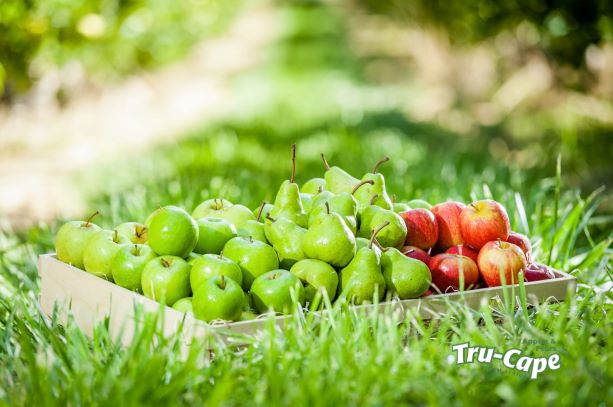While experts scramble to create and test a vaccine against Covid-19, there is plenty we can all do to keep ourselves safe and healthy. According to Tru-Cape Fruit Marketing, the largest exporter of South African apples and pears following President Ramaphosa’s lockdown is first and foremost and keeping a safe distance from other people whom we might infect is another. But, there is lots we can do to stay well in the meantime that doesn’t involve any special equipment or costly ingredients.
Did you know that simply jogging on the spot or raising your arms and legs in the air already goes a long way to increasingly your heart-rate and blood circulation. Or, filling plastic bottles with water is an inexpensive way of making resistance-training weights at home. As a rule of thumb, each litre of water will weigh one kilogram. You could also use Tru-Cape’s 1.5kg apple or pear Happi-packs.
When you do go out shopping, be sure to stock up on plenty fresh fruit and vegetables. Did you know that apples have been found to be one of the best sources of dietary polyphenols? Numerous studies have shown that antioxidants in apples are effective. In a Canadian study, published by Nova Science Publishers, authors H.P. Vasantha Rupasinghe, Surangi Thilakarathna and Sandhya Nair found that the polyphenols found in apples are effective antioxidants and demonstrated to have numerous biological effects in the prevention of various cancers and neurodegenerative as well as to protect against diabetes and other diseases.
Their study showed that apple peels in particular are high in quercetin glycosides. They go on to say that quercetin is recognised as a free-radical scavenger.
Dr Joe Schwarecz is the Director of the McGill Office for Science and Society at Montreal, Canada’s McGill University and the author of the book An Apple A Day. He writes: “The current interest in quercetin, however, has nothing to do with its antioxidant activity. Researchers have been applying computer modelling techniques to identify molecules with structures that could conceivably block the ‘ACE2 receptors’ on cells to which the coronavirus that causes COVID-19 attaches, much like a key fits into a lock. Once the virus enters a cell it hijacks the cellular machinery and uses it to reproduce and crank out more viruses. Based on its molecular structure, quercetin could be a ‘key’ that fits the lock and blocks other ‘keys’”. He goes on to say that there is actually some laboratory evidence that this can happen. After the SARS epidemic, a couple of studies did show that quercetin could block entry of that particular virus into cells. However, that was an “in vitro” experiment and involved a virus that is different from the one that causes COVID-19, albeit it is in the coronavirus family. “Without further studies, we can’t assume that quercetin will also block SARS-CoV-2,” he says, adding that a clinical trial is needed, and one is being organised. At this point, all one can say is that quercetin has the possibility of being useful. Since it occurs in nature, it is regulated as a “Natural Health Product” and dietary supplements have long been available, hyped for their antioxidant potential, usually in daily doses of 500-1000 mgs. The daily intake from our diet is, in general, less than 100 mgs, but quercetin supplements have not been linked with any adverse reaction. Although the information about possible efficacy is sketchy, at least taking quercetin supplements is not harmful,” he ends.
Writing in the Nutrition Journal, authors Jeanelle Boyer and Rui Hai Liu say that some of the most well studied antioxidant compounds in apples include quercetin-3-galactoside, quercetin-3-glu- coside, quercetin-3-rhamnoside, catechin, epicatechin, procyanidin, cyanidin-3-galactoside, coumaric acid, chlorogenic acid, gallic acid, and phloridzin. “Researchers have examined the average concentrations of the major phenolic compounds in six cultivars of apples. They found that the average phenolic concentrations among the six cultivars were: quercetin glycosides, 13.2 mg/100 g fruit; vitamin C, 12.8 mg/100 g fruit; procyanidin B, 9.35 mg/100 g fruit; chlorogenic acid, 9.02 mg/100 g fruit; epicatechin, 8.65 mg/100 g fruit; and phloretin glycosides, 5.59 mg/100 g fruit.”
The bottom line is that there are proven health benefits to eating more apples and pears and in the current fight against Covid-19 quercetin may have an especially beneficial role. And the fact that you can store Tru-Cape apples and pears safely in the fridge for a few weeks means fewer trips to the shops and less exposure to people who may be ill.







